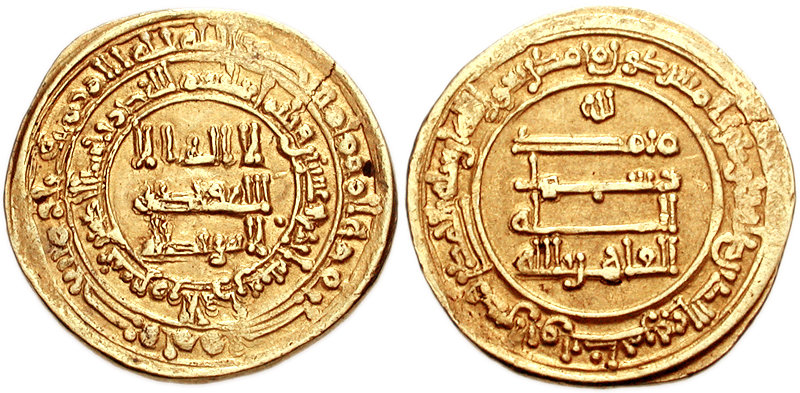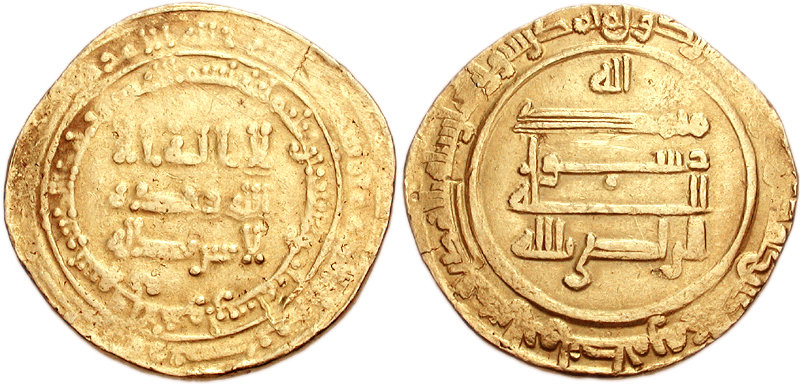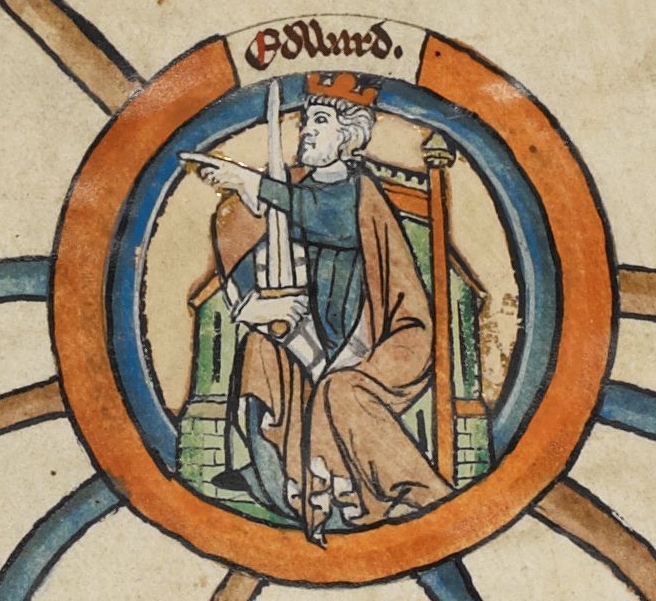|
Al-Qahir
Abu Mansur Muhammad ibn Ahmad al-Mu'tadid ( ar, ØĢØĻŲ اŲŲ ŲØĩŲØą Ų ØŲ ØŊ ØĻŲ ØĢØŲ ØŊ اŲŲ ØđØŠØķØŊ, AbÅŦ al-ManáđĢÅŦr MuáļĨammad ibn AáļĨmad al-MuĘŋtaáļid), usually known simply by his regnal title Al-Qahir bi'llah ( ar, اŲŲاŲØą ØĻاŲŲŲ, al-QÄhir bi-'llÄh, Victorious by the will of God), was the nineteenth Caliph of the Abbasid Caliphate from 932 to 934. He was born 286 AH (899 C.E.) and died 339 AH (950 C.E.). Early life Al-Qahir was a son of the 16th Abbasid caliph, al-Mu'tadid (), and brother of the 18th Caliph, al-Muqtadir (). The mother of al-Qahir was a concubine called Fitnah. (She was the mother of Al-Mu'tadid's third son, Al-Qahir). The full name of Al-Qahir was Muhammad ibn Ahmad al-Mu'tadid al-Qahir bi'llah and his Kunya was Abu Mansur. Rise to the throne Al-Qahir came to the throne as part of his brother's conflict with the increasingly powerful commander-in-chief, Mu'nis al-Muzaffar. He was first chosen as Caliph in March 929, when Mu'nis laun ... [...More Info...] [...Related Items...] OR: [Wikipedia] [Google] [Baidu] |
Al-Muqtadir
Abuâl-Faáļl JaĘŋfar ibn Ahmad al-MuĘŋtaáļid ( ar, ØĢØĻŲ اŲŲØķŲ ØŽØđŲØą ØĻŲ ØĢØŲ ØŊ اŲŲ ØđØŠØķØŊ) (895 â 31 October 932 AD), better known by his regnal name Al-Muqtadir bi-llÄh ( ar, اŲŲ ŲØŠØŊØą ØĻاŲŲŲ, "Mighty in God"), was the eighteenth Caliph of the Abbasid Caliphate from 908 to 932 AD (295â320 AH), with the exception of a brief deposition in favour of al-Qahir in 928. He came to the throne at the age of 13, the youngest Caliph in Abbasid history, as a result of palace intrigues. His accession was soon challenged by the supporters of the older and more experienced Abdallah ibn al-Mu'tazz, but their attempted coup in December 908 was quickly and decisively crushed. Al-Muqtadir enjoyed a longer rule than any of his predecessors, but was uninterested in government. Affairs were run by his officials, although the frequent change of viziersâfourteen changes of the head of government are recorded for his reignâhampered the effectiveness of the administr ... [...More Info...] [...Related Items...] OR: [Wikipedia] [Google] [Baidu] |
Abbasid Caliph
The Abbasid caliphs were the holders of the Islamic title of caliph who were members of the Abbasid dynasty, a branch of the Quraysh tribe descended from the uncle of the Islamic prophet Muhammad, Al-Abbas ibn Abd al-Muttalib. The family came to power in the Abbasid Revolution in 748â750, supplanting the Umayyad Caliphate. They were the rulers of the Abbasid Caliphate, as well as the generally recognized ecumenical heads of Islam, until the 10th century, when the Shi'a Fatimid Caliphate (established in 909) and the Caliphate of CÃģrdoba (established in 929) challenged their primacy. The political decline of the Abbasids had begun earlier, during the Anarchy at Samarra (861â870), which accelerated the fragmentation of the Muslim world into autonomous dynasties. The caliphs lost their temporal power in 936â946, first to a series of military strongmen, and then to the Shi'a Buyid Emirs that seized control of Baghdad; the Buyids were in turn replaced by the Sunni Seljuk Turks i ... [...More Info...] [...Related Items...] OR: [Wikipedia] [Google] [Baidu] |
Abbasid Caliph
The Abbasid caliphs were the holders of the Islamic title of caliph who were members of the Abbasid dynasty, a branch of the Quraysh tribe descended from the uncle of the Islamic prophet Muhammad, Al-Abbas ibn Abd al-Muttalib. The family came to power in the Abbasid Revolution in 748â750, supplanting the Umayyad Caliphate. They were the rulers of the Abbasid Caliphate, as well as the generally recognized ecumenical heads of Islam, until the 10th century, when the Shi'a Fatimid Caliphate (established in 909) and the Caliphate of CÃģrdoba (established in 929) challenged their primacy. The political decline of the Abbasids had begun earlier, during the Anarchy at Samarra (861â870), which accelerated the fragmentation of the Muslim world into autonomous dynasties. The caliphs lost their temporal power in 936â946, first to a series of military strongmen, and then to the Shi'a Buyid Emirs that seized control of Baghdad; the Buyids were in turn replaced by the Sunni Seljuk Turks i ... [...More Info...] [...Related Items...] OR: [Wikipedia] [Google] [Baidu] |
Al-Radi
Abu'l-Abbas Ahmad (Muhammad) ibn Ja'far al-Muqtadir ( ar, ØĢØĻŲ اŲØđØĻاØģ ØĢØŲ ØŊ (Ų ØŲ ØŊ) ØĻŲ ØŽØđŲØą اŲŲ ŲØŠØŊØą, AbÅŦ al-ĘŋAbbÄs AáļĨmad (MuáļĨammad) ibn al-Muqtadir; December 909 â 23 December 940), usually simply known by his regnal name al-Radi bi'llah ( ar, اŲØąØ§ØķŲ ØĻاŲŲŲ, al-RÄáļÄŦ bi'llÄh, Content with God), was the twentieth Caliph of the Abbasid Caliphate, reigning from 934 to his death. He died on 23 December 940 at the age of 31. His reign marked the end of the caliph's political power and the rise of military strongmen, who competed for the title of . Early life The future al-Radi was born on 20 December 909, to the caliph al-Muqtadir () and a Greek-born slave concubine named Zalum. At the age of four, he received the nominal governorship of Egypt and the Maghreb, and was sent with the commander-in-chief Mu'nis al-Muzaffar to Egypt, who became his tutor. When Mu'nis and al-Muqtadir fell out in 927, Abu'l-Abbas and the vizier Ibn Muqla tr ... [...More Info...] [...Related Items...] OR: [Wikipedia] [Google] [Baidu] |
899 Births
__NOTOC__ Year 899 ( DCCCXCIX) was a common year starting on Monday (link will display the full calendar) of the Julian calendar. Events By place Europe * Summer – King Arnulf of Carinthia enlists the support of the Magyars, to raid northern Italy. They overrun the Lombard plain all the way to Pavia. King Berengar I assembles a large army against the Magyars, and confronts them near the Adda River. Daunted at the strong force, ÃrpÃĄd (head of the confederation of the Hungarian tribes) offers to make peace and restore much of what they've taken, if they are permitted to leave Italy unmolested. Berengar refuses, and the Magyars withdraw to the Brenta River. ÃrpÃĄd renews his offer, offering to leave all his booty and even some hostages. Again Berengar refuses, and awaits their crossing of the Brenta River for a final battle. * Battle of the Brenta: The Magyar forces, consisting of 5,000 men, take a circuitous route through the mountains, crossing the Brenta Rive ... [...More Info...] [...Related Items...] OR: [Wikipedia] [Google] [Baidu] |
Al-Mu'tadid
AbÅŦ al-ĘŋAbbÄs AáļĨmad ibn áđŽaláļĨa al-Muwaffaq ( ar, ØĢØĻŲ اŲØđØĻاØģ ØĢØŲ ØŊ ØĻŲ Ø·ŲØØĐ Ø§ŲŲ ŲŲŲ), 853/4 or 860/1 â 5 April 902, better known by his regnal name al-MuĘŋtaáļid bi-llÄh ( ar, اŲŲ ØđØŠØķØŊ ØĻاŲŲŲ, link=no, "Seeking Support in God"), was the caliph of the Abbasid Caliphate from 892 until his death in 902. Al-Mu'tadid was the son of al-Muwaffaq, who was the regent and effective ruler of the Abbasid state during the reign of his brother, Caliph al-Mu'tamid. As a prince, the future al-Mu'tadid served under his father during various military campaigns, most notably in the suppression of the Zanj Rebellion, in which he played a major role. When al-Muwaffaq died in June 891 al-Mu'tadid succeeded him as regent. He quickly sidelined his cousin and heir-apparent al-Mufawwid; when al-Mu'tamid died in October 892, he succeeded to the throne. Like his father, al-Mu'tadid's power depended on his close relations with the army. These were first forged duri ... [...More Info...] [...Related Items...] OR: [Wikipedia] [Google] [Baidu] |
Abbasid Dynasty
The Abbasid dynasty or Abbasids ( ar, ØĻŲŲ اŲØđØĻاØģ, Banu al-ĘŋAbbÄs) were an Arab dynasty that ruled the Abbasid Caliphate between 750 and 1258. They were from the Qurayshi Hashimid clan of Banu Abbas, descended from Abbas ibn Abd al-Muttalib. The Abbasid Caliphate is divided into three main periods: Early Abbasid era (750â861), Middle Abbasid era (861â936) and Later Abbasid era (936â1258). A cadet branch of the dynasty also ruled as ceremonial rulers for the Mamluk Sultanate as Caliph (1261â1517), until their conquest by the Ottoman Empire. Ancestry The Abbasids descended from Abbas, one of Muhammad's companions (as well as his uncle) and one of the early Qur'an scholars. Therefore, their roots trace back to Hashim ibn 'Abd Manaf and also Adnan in the following line: Al-âAbbas ibn Abdul-Muttalib ibn Hashim ibn Abd Manaf ibn Qusai ibn Kilab ibn Murrah ibn Ka'b ibn Lu'ay ibn Ghalib ibn Fihr ibn Malik ibn An-Nadr ibn Kinanah ibn Khuzaima ibn Mudrikah ibn Ily ... [...More Info...] [...Related Items...] OR: [Wikipedia] [Google] [Baidu] |
Meadows Of Gold
''Meadows of Gold and Mines of Gems'' ( ar, Ų ŲØąŲŲØŽ ŲąŲØ°ŲŲŲŲØĻ ŲŲŲ ŲØđŲاØŊŲŲ ŲąŲŲØŽŲŲŲŲŲØą, ') is a book of history in Arabic of the beginning of the world starting with Adam and Eve up to and through the late Abbasid Caliphate by medieval Baghdadi historian Al-Masudi ( ar, ŲąŲŲŲ ŲØģŲØđŲŲØŊŲŲŲ, link=no). Editions and translations A first version of the book was allegedly completed in the year 947 AD and the author spent most of his life adding and editing the work. The first European version of ''The Meadows of Gold'' was published in both French and Arabic between 1861 and 1877 by the Societe Asiatique of Paris by Barbier de Meynard and Pavet de Courteille. For over 100 years this version was the standard version used by Western scholars until Charles Pellat published a French revision between 1966 and 1974. This revision was published by the Universite Libanaise in Beirut and consisted of five volumes. Translated and edited by Paul Lunde an ... [...More Info...] [...Related Items...] OR: [Wikipedia] [Google] [Baidu] |
Al-Mas'udi
Al-Mas'udi ( ar, ØĢŲØĻŲŲ ŲąŲŲØŲØģŲŲ ØđŲŲŲŲŲ ŲąØĻŲŲ ŲąŲŲØŲØģŲŲŲŲ ŲąØĻŲŲ ØđŲŲŲŲŲ ŲąŲŲŲ ŲØģŲØđŲŲØŊŲŲŲ, '; â956) was an Arab historian, geographer and traveler. He is sometimes referred to as the "Herodotus of the Arabs". A polymath and prolific author of over twenty works on theology, history (Islamic and universal), geography, natural science and philosophy, his celebrated magnum opus '' MurÅŦj al-Dhahab wa-Ma'Ädin al-Jawhar'' ( ar, Ų ŲØąŲŲØŽ ŲąŲØ°ŲŲŲŲØĻ ŲŲŲ ŲØđŲاØŊŲŲ ŲąŲŲØŽŲŲŲŲŲØą, link=no), combines universal history with scientific geography, social commentary and biography, and is published in English in a multi-volume series as '' The Meadows of Gold and Mines of Gems''. Birth, travels and literary output Apart from what Al-Mas'udi writes of himself little is known. Born in Baghdad, he was descended from Abdullah Ibn Mas'ud, a companion of Muhammad. He mentions many scholar associates met on his travels thr ... [...More Info...] [...Related Items...] OR: [Wikipedia] [Google] [Baidu] |
Vizier (Abbasid Caliphate)
The vizier ( ar, ŲØēŲØą, wazÄŦr) was the senior minister of the Abbasid Caliphate, and set a model that was widely emulated in the Muslim world. Many viziers came to enjoy considerable power, even at times eclipsing the Abbasid caliphs and using them as puppets. The majority of the viziers were of non-Arab origin, and several were also notable patrons of poets and scholars, sponsoring the Translation Movement as well as religious works. History The term ''wazÄŦr'' originally meant "helper", and appears in this sense in the Quran. It was later adopted as a title, in the form of () by the proto-Shi'a leaders al-Mukhtar and Abu Salama. Under the Abbasid caliphs, the term acquired the meaning of 'representative' or 'deputy'. Early period The exact origins of the office of vizier are not entirely clear. Some historians have suggested that it should be traced to pre-Islamic practices in Sasanian Persia (cf. ''wuzurg framadar''), but others have stressed an independent evolution in ... [...More Info...] [...Related Items...] OR: [Wikipedia] [Google] [Baidu] |
Hujariyya (Abbasid Troops)
The Hujariyya ( ar, ØØŽØąŲØĐ, áļĪujariyya, Men of the Chambers) were an elite cavalry corps that was one of the chief components of the late Abbasid army, from to their forcible disbandment in 936. Etymology The name derives from the word for 'chamber, room' (), and refers to troops housed and trained in or near the caliphal palace and its chambers. Establishment The first unit of this name was established by the Abbasid caliph al-Mu'tadid (). They were military slaves (s or ) who were placed under the training of eunuch tutors () and kept under close supervision, not being allowed to exit the palace except in the company of their tutors. They fought mainly as mounted archers. Role and history First mentioned in 900, they would form the main cavalry force of the Abbasid army in the 10th century. Despite their military prowess, they are rarely recorded as participating in campaigns or in provincial garrisons, and spent most of their time in Baghdad, where they served ostensib ... [...More Info...] [...Related Items...] OR: [Wikipedia] [Google] [Baidu] |
Ahmad Al-Khasibi
Ahmad ( ar, ØĢØŲ ØŊ, ĘūAáļĨmad) is an Arabic male given name common in most parts of the Muslim world. Other spellings of the name include Ahmed and Ahmet. Etymology The word derives from the root (áļĨ-m-d), from the Arabic (), from the verb (''áļĨameda'', "to thank or to praise"), non-past participle (). Lexicology As an Arabic name, it has its origins in a Quranic prophecy attributed to Jesus in the Quran which most Islamic scholars concede is about Muhammad. It also shares the same roots as Mahmud, Muhammad and Hamed. In its transliteration, the name has one of the highest number of spelling variations in the world. Though Islamic scholars attribute the name Ahmed to Muhammed, the verse itself is about a Messenger named Ahmed, whilst Muhammed was a Messenger-Prophet. Some Islamic traditions view the name Ahmad as another given name of Muhammad at birth by his mother, considered by Muslims to be the more esoteric name of Muhammad and central to understanding his nat ... [...More Info...] [...Related Items...] OR: [Wikipedia] [Google] [Baidu] |

.jpg)





